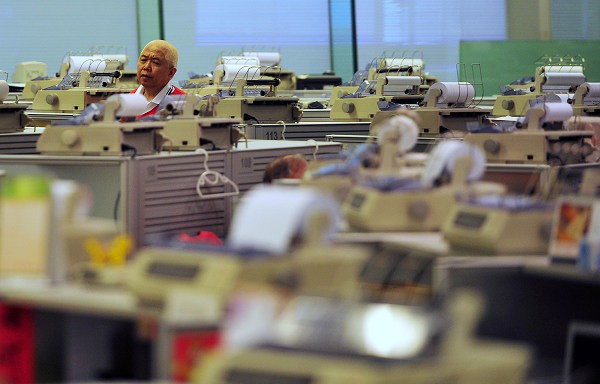Tuesday, 01 September 2015 12:45
 HONG KONG: Asian stocks sank Tuesday after more data showed weakness in China’s economy, while gold and the yen advanced amid a search for safer assets, sending Tokyo tumbling almost four percent.
HONG KONG: Asian stocks sank Tuesday after more data showed weakness in China’s economy, while gold and the yen advanced amid a search for safer assets, sending Tokyo tumbling almost four percent.
Traders are also watching the release Friday of a US jobs report, which could play a key role in the Federal Reserve’s decision whether to raise interest rates this month, adding to market uncertainty.
There are fears a rate rise would further jolt confidence in the global economy, which has already been rocked by the rout in Chinese stock markets.
“Investors are concerned about the strength of the global economy, which is why you’re seeing a sell-off in various stock markets,” said Ayako Sera, a strategist at Sumitomo Mitsui Trust Bank Ltd. in Tokyo.
“Investors are also taking a cautious stance.”
Shanghai was down two percent in the afternoon — having dived more than four percent at one point — after China’s statistics bureau said its Purchasing Managers’ Index (PMI) of manufacturing activity came in at 49.7 last month, the lowest since August 2012.
While the figure is better than a private reading from Chinese media group Caixin — which hit a six-and-a-half-year low — it is still below the 50-point mark.
A rating after 50 indicates expansion, below denotes contraction.
Tokyo dived 3.84 percent to 18,165.69, with a stronger yen hitting exporters. Sydney fell 2.12 percent to 5,096.4 and Seoul gave up 1.40 percent to close at 1,914.23.
In afternoon trade Hong Kong was off 0.76 percent.
“The manufacturing index still shows that the economy is in the process of seeking a bottom,” said Wu Kan, a Shanghai-based fund manager at JK Life Insurance.
“The market is unlikely to pick up anytime soon.”
– Shift to safety –
===================
China’s stock markets have slumped 40 percent since hitting a June 12 peak as investors grow concerned about high valuations and the strength of the world’s number two economy.
There are fears that China’s leaders are struggling to get a grip on the crisis as a series of measures — including five interest rate cuts since November — have failed to staunch the sell-off.
In the latest bid to avert a further rout, Beijing urged listed companies to merge and restructure.
Authorities will strongly encourage tie-ups to help push reform of state companies and inject vitality into the economy, a joint statement released by four government agencies said late Monday.
The notice also stressed measures to boost the stock market, including encouraging firms to pay cash dividends, encouraging investors to hold stock for the long term, and urging companies to buy back their own stock — which should see prices rise.
The extreme volatility has convulsed global stocks and pushed up the price of investments considered safe, including the yen and bullion.
On Tuesday the dollar fell to 120.50 yen from 121.24 yen in New York trade Monday, while gold traded at $ 1,144.45, against $ 1,131.62 late Monday.
Oil prices fell in Asia after recording gains of more than 25 percent over the previous three sessions.
US benchmark West Texas Intermediate for October delivery fell $ 1.54, or three percent, to $ 47.66 and Brent crude for October dropped $ 1.46, or 2.7 percent, to $ 52.69 a barrel.
The commodity, which had already posted big gains on Thursday and Friday, surged Monday after the US Department of Energy said domestic output in June was much lower than first stated, while monthly estimates for January-May were revised lower.
Also, a statement from the OPEC oil cartel — to the effect that the continuing downward pressure on prices “remains a cause for concern” — fuelled hopes it will cut its own output levels.
The Organization of the Petroleum Exporting Countries, responsible for about 40 percent of global crude production, tied the price pressure to higher production and market speculation.
“Needless to say, OPEC, as always, will continue to do all in its power to create the right enabling environment for the oil market to achieve equilibrium with fair and reasonable prices,” OPEC said in a monthly report.
Among other Asian stock markets, Wellington dipped 0.02 percent to 5,654.99 and Taipei sank 1.92 percent to 8,017.56.




























